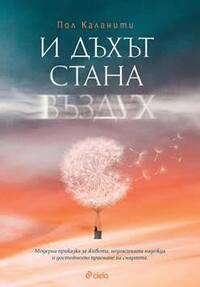Take a photo of a barcode or cover
emotional
reflective
sad
slow-paced
This is a heart-breaking book over a neurosurgeon and his own decline due to lung cancer. It made me cry a couple of times and reflect and ponder about mortality. Do not read if youre not emotionally prepared for such a story as it is really hard to swallow.
emotional
informative
reflective
emotional
reflective
medium-paced
Think Tuesdays with Morrie if told from his perspective. Really introspective and heart aching.
emotional
inspiring
sad
medium-paced
emotional
hopeful
inspiring
reflective
sad
medium-paced
«قبل از تشخیص سرطانم هم میدانستم روزی میمیرم، اما نمیدانستم کی. بعد از تشخیص هم میدانستم که یک روز میمیرم، اما نمی دانستم کی. اما حالا آن را دقیق میدانم. در واقع مشکل علمی نبود، حقیقت مرگ برهم زننده است. با وجود این راه دیگری برای زنده ماندن نیست.»
بدون شک یکی از تاثیرگذارترین کتابهایی که خوندم. کتابی که بعد خوندنش غمگین میشید، ولی بعد متوجه میشید به این غمگین شدن به شدت نیاز دارید. وقتی بخونیدش که حال روحی خوبی دارید.
This book was amazing, it was such an interesting perspective on life and death and I loved it. It was super heavy at some points, but it was also beautiful.
If you've read the blurb to this book you already know it won't end happily. But suffused amongst the inevitable decline and death of writer, Paul Kalanithi, is a wonder at life; a hope for those that remain to explore humanity in all its guises.
Kalanithi speaks about his own interest in how the brain makes the mind, makes the person. With that interest informing his studies and career and ultimately guiding him until his end. In fact by confronting death, Kalanithi has no choice but to assess what, to him, was important in life.
I had expected that cancer or at least death would be the 'enemy' in the story but this memoir is far more nuanced. Kalanithi is sharing an awful experience that none of us would welcome but one that he accepts as a part of his life. He doesn't give in but he does find a way to navigate his darkest time with grace and strength. Incredibly moving.
Kalanithi speaks about his own interest in how the brain makes the mind, makes the person. With that interest informing his studies and career and ultimately guiding him until his end. In fact by confronting death, Kalanithi has no choice but to assess what, to him, was important in life.
I had expected that cancer or at least death would be the 'enemy' in the story but this memoir is far more nuanced. Kalanithi is sharing an awful experience that none of us would welcome but one that he accepts as a part of his life. He doesn't give in but he does find a way to navigate his darkest time with grace and strength. Incredibly moving.
Heavy: listening to this (on Audible) was a sobfest. The book was not as enlightening as I had hoped. Having finished it, I think I'll take a break from my "on mortality" reading binge. In this book, however, the author mentioned several books I can consider, if and when I choose to continue binging, starting with Tolstoy's The Death of Ivan Ilyich.
emotional
reflective
sad
medium-paced





